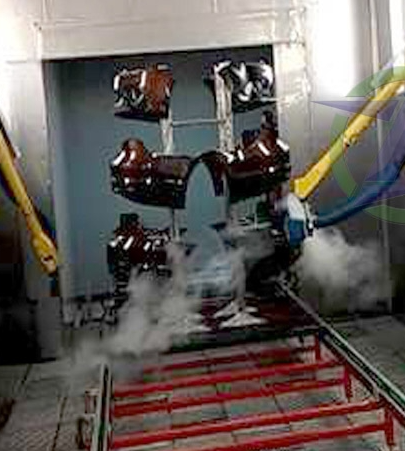CO2 Cleaning
The bumper CO₂ pre-treatment cleaning technology is a critical process in automotive manufacturing for surface preparation prior to bumper coating. It aims to remove surface contaminants such as oil, grease, dust, and other impurities, ensuring optimal adhesion and uniformity of subsequent spray painting.

Principle: Utilizes solid CO₂ particles (snow-like or dry ice) propelled onto the bumper surface. The extreme low temperature (-60°C to -80°C) embrittles contaminants, while high-speed airflow physically dislodges residues. Two operational modes are defined:
Snow Cleaning Mode:
Liquid CO₂ expands into snow-like particles through nozzles, generating mild impact force suitable for light oil/grease removal.
Dry Ice Cleaning Mode:
Compressed CO₂ snow forms denser pellets with stronger kinetic energy, effective for stubborn contaminants but potentially affecting surface roughness.
Equipment & Energy Consumption:
Equipment costs are 30% lower than conventional water washing systems.
Relies on compressed air supply and liquid CO₂ storage tanks.
Energy consumption: ~200 kW/hour; compressed air usage: 400 Nm³/hour.
Environmental advantage: Zero wastewater discharge.
Advantages:
Wastewater-free operation
Adaptable to complex curvatures (requires robotic contour-following systems)
Aligns with green manufacturing standards
Weaknesses:
Limited efficacy on heavy oil/grease deposits
Requires mold-release-agent-free injection molding processes
Strict ambient humidity control (40-70% RH) mandatory
